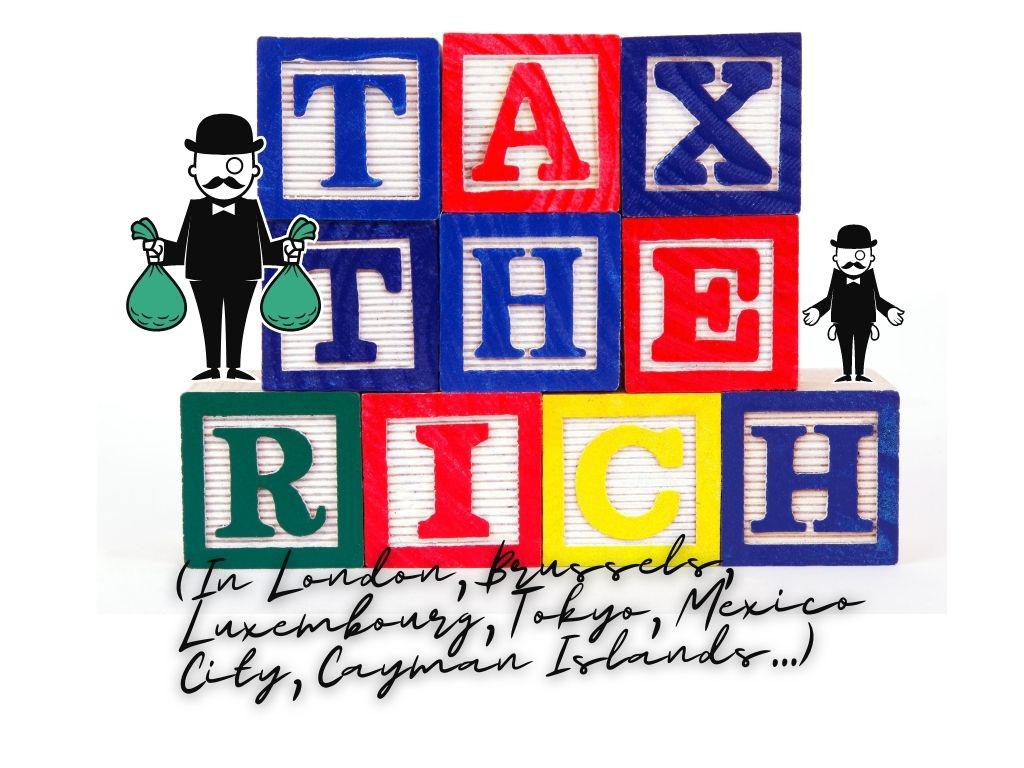There’s been a number of criticism concerning the proposed billionaire tax plan. Some see it as too … [+]
Over the weekend, Treasury Secretary Janet Yellen threw out the most recent tax thought from the Biden administration – tax unrealized capital gains held by billionaires to fund Biden’s “Build Back Better” Act, a mammoth invoice that has issues you’ll like in it and issues that you’ll hate in it.
The billionaire tax pays for it, Yellen said.
The tax invoice is within the Senate Finance Committee. At the moment, the tax code stipulates that unrealized capital gains aren’t taxable income. The brand new proposal would tax unrealized capital good points, that means individuals with tons of of hundreds of thousands of {dollars} in securities investments can not defer tax funds on good points made every year.
If Jeff Bezos’ holding in Amazon went up by $1 billion in a 12 months, he would pay tax on that wealth achieve, whether or not or not he bought the inventory. Few will cry for Jeff Bezos in America.
Alexandria Ocasio-Cortez and Aurora James on the 2021 Met Gala on September 13, 2021 in New York … [+]
Even those that aren’t large followers of Bezos will blast Biden’s “Marxist” tax the wealthy scheme that seemingly received’t cease on the tremendous prosperous, all to pay for his “much more Marxist” Construct Again Higher plans.
Others will keep on with the drained slogan of “fair share” funds. That just about sums up all the debate.
Nonetheless, the billionaire tax shall be a tough job and a headache for the Inner Income Service to do that. It requires an entire new administrative equipment and the IRS is already stretched.
Plus, if you happen to cost a billionaire an enormous tax in 12 months one as a result of their fairness portfolio rose in worth, do you give all of them a credit score when that worth declines?
So right here’s a greater thought: let’s tax international buyers shopping for U.S. shares and bonds as an alternative. Robert Lighthizer was given house in The Economist on October 5th to ponder such the concept.
This could not solely elevate tons of of billions in tax income, it might make the U.S. greenback, and our whole financial system, more competitive globally. The overvalued greenback has been an issue for everybody besides the U.S. monetary system for years. MIT Sloan School economists were writing about this back in the 1990s.
Wall Road will hate a tax on international inflows as a lot as they’d hate the billionaire tax.
Purchasers may transfer cash offshore, they’d say concerning the billionaire tax plan (although that doesn’t imply they’d lose a consumer as all of them have offshore avenues for his or her excessive internet price purchasers anyway).
However below a market entry cost, in the event that they did transfer cash offshore, they’d turn into a international investor. So in the event that they purchased U.S. shares from their Cayman account, let’s hit them with a market entry cost of, say, 2%, and acquire the tax that manner.
If few cry for Bezos, I can guarantee you that even much less cry for London bond lords, and high-speed Tokyo forex merchants. Most individuals most likely don’t even know what that’s, or the impression their trades have on our financial system.
International buyers ship hundreds of billions into the U.S. securities market every year. They account for round 16% of all shares owned within the U.S. A few of them are European life insurance coverage companies. Others are Japanese wealth fund managers. Some are funding cowboys at international funding companies that borrow cash at tremendous low curiosity at house, then make investments it in increased rates of interest, like American company bonds. So it’s like this: they borrow at 0.5%, purchase American bonds or dividends paying 3%, pocket the distinction. This drives up demand for the greenback and retains the greenback sturdy.
When Wall Road needs a powerful greenback, it’s as a result of it needs corporations to have the ability to supply cheaply abroad, and — simply as vital (if no more so) — it means extra foreigners shopping for U.S. securities.
In August, international buyers purchased $2.3 trillion (with a T) of U.S. shares. They purchased one other $2.2 trillion price of U.S. authorities bonds, based mostly on Treasury information. In case you taxed these new purchases at 2%, you’d get round $80 billion from taxes on inventory and bond investments made by international companies in a single month.
It’s much less controversial taxing European life insurers, than it’s taxing People. The U.S. might certainly do each, however the latter would have an effect on greenback inflows into the nation, and that may make the greenback extra aggressive.
A aggressive greenback would make our imports costlier, giving extra enterprise to U.S. producers. It means American corporations may have one much less excuse to put money into factories overseas, as a result of their greenback won’t go as far. It might additionally make U.S. exports extra aggressive, enhancing the commerce steadiness.
Container ships from Asia wait to dock on the Port of Lengthy Seashore. The U.S. will import greater than $2 … [+]
The U.S. commerce deficit in items will are available in at $1.1 trillion this 12 months, a document breaker. That’s practically the scale of all the Mexican financial system. On steadiness, not counting what we additionally export, the U.S. imported double that, that means we devour extra from overseas than all the Mexican financial system produces, that’s how big of an issue that is. One purpose we are able to do that’s due to a powerhouse greenback. Not a powerful greenback. A steroid injected, muscle-head greenback with 23 inch Hulk Hogan-sized weapons.
Positive, a tax on international portfolio inflows would lead some currencies just like the Mexican peso or a managed forex just like the Chinese language renminbi to observe the greenback downwards. But when that occurs, the U.S. would simply elevate the tax as a counterweight following clear technical tips. The greenback would a minimum of be made aggressive in opposition to main currencies — particularly the Euro, yen, and pound.
Joseph Gagnon, an economist on the Peterson Institute for Worldwide Economics (PIIE) , wrote about this last year.
“The principle reason for the deficit is a secular overvaluation of the greenback, pushed by extreme monetary flows into greenback belongings from international official and personal buyers,” Gagnon mentioned.
For PIIE, our commerce deficits – which damage labor, which damage home manufacturing, which make every thing about Fb and studying to code – are largely brought on by the greenback’s overvaluation, not by the undervaluation of the peso or the Chinese language renminbi. If China is the world’s go-to manufacturing hub, the U.S. is the world’s go-to securities market.
“U.S. capital markets are the topped jewel of the U.S. financial system,” says Eric Lorber, Senior Director of the Middle on Financial and Monetary Energy on the Basis for Protection of Democracies in Washington.
America is falling deeper and deeper into an financial pit, and one purpose is as a result of it is rather exhausting for the U.S. to compete globally if our competitors’s forex is price much less.
Earnings inequality and financial alternative is polarizing the nation. Going deeper into debt below the Biden agenda received’t work if the usremains uncompetitive and a dumping floor for Asian producers.
The Competitive Dollar for Jobs and Prosperity Act, which Tammy Baldwin (D-MN) and Josh Hawley (R-MO) launched within the Senate two years in the past, would tax international buyers of U.S. shares and bonds. That’s not a tax on doing enterprise right here, or a tax on American buyers.
Sen. Tammy Baldwin, D-Wis.: Let’s tax international inflows from cash managers overseas. (AP Photograph/Jose … [+]
Sectors of Wall Road received’t like both of those concepts – going after Bezos or going after Belgium bankers. Wall Road funded Biden’s marketing campaign. Now he’s received an impediment in his manner.
However, a market entry cost for international buyers is a neater promote than taxes on American wealth, billionaire or not.
A tax on international influx is simpler as a result of each transaction is already registered with the brokerage agency who then reviews to the IRS. The reporting of buy and gross sales of securities already exists.
Brazil did this years in the past when the Brazilian actual was too sturdy in a weak financial system, at round BRL1.5 to the greenback. Wall Road rising market bond fund managers complained, however they didn’t abandon Brazil. Finally, the actual weakened.
* * *
An overvalued greenback makes it cheaper for the U.S. to devour items from around the globe as an alternative of constructing extra of these items right here.
Greenback energy isn’t an indication of a very good financial system, essentially. More and more, greenback energy is an indication of weak markets in Europe and low yield in different large economies like Japan.
Our monetary sector retains them coming.
Wall St. road signal with New York Inventory Change within the background
The nearer you might be to a brief term-trader, the extra you’re going to hate a tax on the greenback. And the nearer you might be to the king greenback ideologues, the extra you’re going to hate taxing international inflows simply since you imagine a powerful greenback means a powerful financial system (regardless of the actual fact lots of those self same individuals will even inform you that our financial system is in shambles).
It’s difficult. However on steadiness, an overvalued greenback does the U.S. no favors. Most of that overvaluation is because of international portfolio cash. Taxing the foreigners will assist tame it. It would assist fund Biden’s plans.
Additionally, taxing international speculators who add nothing to America’s productive financial system and might destroy America’s competitiveness by forcing up the greenback’s worth can be extra common, and — just like the billionaire tax — would pay for Biden’s infrastructure plans.
To paraphrase a Senator from the Struggle on Poverty days within the late Sixties, Russell B. Lengthy: “Do not tax me. Do not tax thee. Tax that man past the ocean.”

